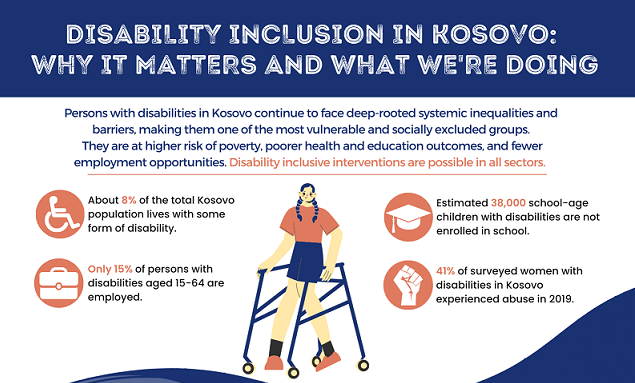 Person with a physical disability enters public transport with an accessible ramp.
Person with a physical disability enters public transport with an accessible ramp.
Nearly 100,000 people in Kosovo – about 8% of the total population – live with some form of disability. Persons with disabilities continue to face deep-rooted systemic inequalities and barriers, making them one of the most vulnerable and socially excluded groups in Kosovo. They are at higher risk of poverty, poorer health and education outcomes, and have fewer employment opportunities than persons without disabilities. An estimated 38,000 school-age children with disabilities are not in school, and only 15% of persons with disabilities aged 15-64 are employed.
Women and ethnic minorities with disabilities have additional and acute barriers in accessing services and opportunities due to multiple layers of discrimination and restrictive cultural norms. Members of the Roma, Ashkali, and Egyptian communities who have disabilities experience significantly fewer mean years of education (with 45% having never attended school), thus reducing or eliminating their chances of employment. Moreover, stereotypes and negative public attitudes underpin disability-based discrimination, violence, and abuse. According to a 2019 OSCE survey report on violence against women, 41% of women with disabilities from Kosovo experienced abuse in the 12 months prior to the survey.
Many persons with disabilities in Kosovo also face significant unmet healthcare needs that further reduce their chances of participating in society. As the public health system does not offer individualized rehabilitation services, such services are partially provided by Kosovo organizations for persons with disabilities. Without equitable access to education and health care, social services and employment, persons with disabilities risk becoming entrapped in a vicious cycle of poverty and exclusion that can continue for generations. Disability-inclusive development is essential to address the systemic and intersecting barriers that hold back persons with disabilities from accessing development opportunities.
Access the Kosovo Country Profile on Disability Inclusion for a summary of the legal and social context affecting persons with disabilities in Kosovo.

Our Commitment to Promoting Disability-inclusive Development in Kosovo
Over the last several years, the World Bank has accelerated its support for disability-inclusive development with significant strides in operations and analytical work. Through its Disability Inclusion and Accountability Framework, the World Bank is applying a twin-track approach to promoting disability-inclusive development in its operations and projects in Kosovo by: (i) ensuring that persons with disabilities can both participate in and benefit from projects in general, and (ii) incorporating specific activities targeted to support, benefit, and empower persons with disabilities.
Persons with disabilities know best what works for them and what does not. Yet, they are continuously left out of decision-making processes. Involving persons with disabilities in project design is essential in maximizing impact and ensuring that achieved solutions are genuinely inclusive and representative of their needs. This entails for example organizing early and ongoing consultations with persons with disabilities, implementing accessible feedback and grievance mechanisms, seeking guidance and advice from local organizations for persons with disabilities, and investing in training and capacity-building initiatives for people with disabilities to participate in project design.
Identification and removal of the environmental, institutional, and attitudinal barriers experienced by persons with disabilities is key to ensuring broader targeting and expanding project benefits. This entails conducting targeted outreach, setting targets/quotas for disability inclusion, ensuring physical accessibility of venues, organizing accessible transportation, recruiting sign language interpreters, and developing accessible communication materials.
Reliable disability-disaggregated data in project monitoring is integral to better understanding the needs of persons with disabilities and designing evidence-based, fair, and inclusive interventions. This entails disaggregating monitoring data by gender, age, and disability, training staff on the collection, use, and monitoring of disability data, using accessible data collection and monitoring methods, and developing databases to identify and keep track of disability participants. Raising awareness about disability among staff, the client, and implementing partners, and the provision of trainings on the collection, use, and monitoring of disability data throughout project’s life also help increase inclusiveness of people with disabilities.

The World Bank is committed to strengthening clients’ capacities in implementing disability-inclusive development programs. As part of this commitment, the Social Sustainability and Inclusion (SSI) Global Practice has developed a disability inclusion training for Kosovo government staff and implementing partners. The training was piloted with two projects – the Kosovo Digital Economy Project (KODE) and Municipalities for Youth (M4Y) – leading to the adoption of concrete disability-inclusive practices in each project. M4Y has applied disability-inclusive communication (including images of youth with disabilities in outreach material and sign language in promotional animation) and has improved disability-inclusive targeting of training participants by incorporating participation quotas for youth with disabilities. Similarly, the KODE project team has incorporated disability-inclusion criteria in operational and procurement documents with the aim of boosting and tracking the participation of youth with disabilities in IT trainings.
To learn more about accessibility barriers and recommendations, methodologies, and strategies for fostering disability inclusion in operations, visit the World Bank’s Technical Note on Accessibility.



Join the Conversation